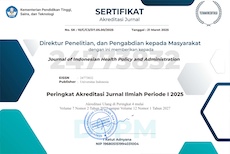Abstract
JKN (National Health Insurance) is a government program that aims to provide health assurance for all Indonesian citizens for a healthy, productive, and prosperous life. In the two years after JKN was implemented, various problems occurred. This research used the qualitative approach with the Edward II implementation theory. Results of the research indicated that there were problems in communication, stemming from the lack of socialization and inharmonic regulations, there was also the problem of the lack of healthcare resources. From the disposition side, the policy makers often obstructs the implementation preparation, this is evident from the information on determining the premium size. From the organization structure, all the stakeholders have been well coordinated. We conclude that we are not ready to implement the JKN. We recommend that mass and effective socialization program to be performed using various methods of communication and involve the community. To reduce the disparity of healthcare services, we recommend that the regional government to establish various healthcare facilities to accelerate health development. There should also be regulations that allocates healthcare staff in every corner of the country to achieve Universal Health Coverage in 2019, as stated in the National Health Insurance Road Map.
Recommended Citation
Hasan, Muhammad Arief Rosyid; Oktamianti, Puput; and Ayuningtyas, Dumilah
(2016)
"An Analysis of The National Health Insurance Policy Implementation in 2014 (Presidential Regulation No. 12 And 111/2013 on Health Insurance) from The Regulator’s Position,"
Journal of Indonesian Health Policy and Administration: Vol. 1:
No.
2, Article 6.
DOI: 10.7454/ihpa.v1i2.1011
Available at:
https://scholarhub.ui.ac.id/ihpa/vol1/iss2/6
Included in
Health Policy Commons, Health Services Administration Commons, Health Services Research Commons




